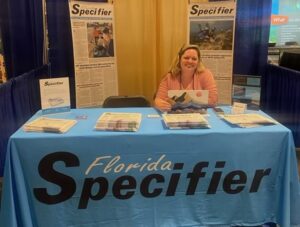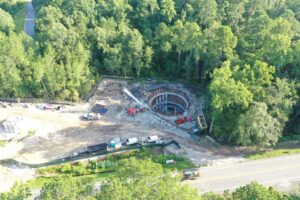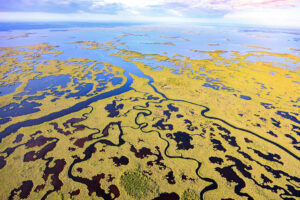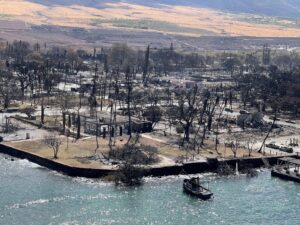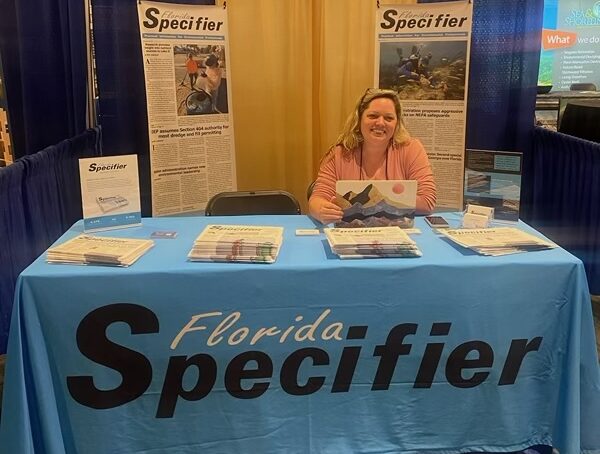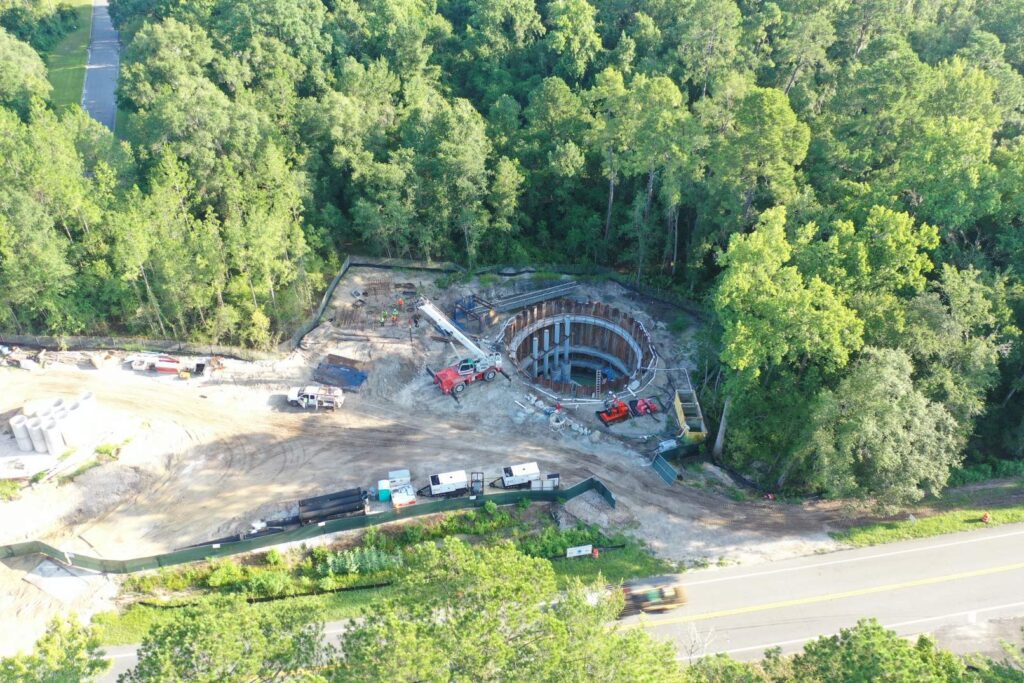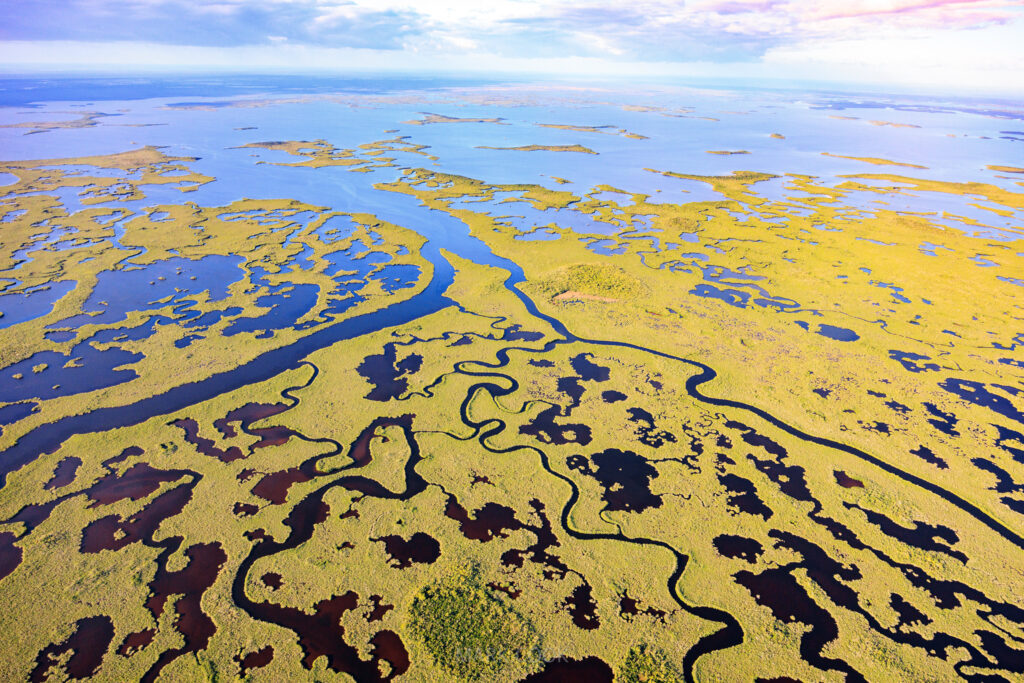SJRWMD Waiving Fees For Plugging Old Wells
The Saint Johns River Water Management District is promoting opportunities to plug abandoned free-flowing wells to save millions of gallons of water in northeast and east-central Florida. To accelerate the well abandonment work, the District’s Governing Board is waiving the fees associated with plugging eligible abandoned artesian wells within the District’s 18-county region, saving property owners $600.
The District has aggressively worked with other agencies, local governments, and the public to detect, evaluate, and control abandoned artesian (free-flowing) wells since the early 1980s. Many artesian wells were used for historic agricultural operations and may now be abandoned. Older artesian wells were typically drilled to a deeper portion of the aquifer and are more susceptible to increases in salinity or contaminants. As the well ages, deterioration of the well casing can occur potentially allowing lower-quality water to move into other zones of the aquifer that are used for drinking water supplies.
The District is reminding its constituents that free-flowing abandoned artesian wells can waste millions of gallons of water each day. Uncontrolled, improperly constructed, or deteriorating artesian wells can have an adverse impact on the quantity and quality of water within aquifers and other water bodies. In addition, non-flowing abandoned wells may also act as a conduit for sources of contaminants to enter the aquifer from the land’s surface.
Shannon Estenoz Named Chair of South Florida Task Force
Shannon Estenoz, Assistant Secretary for Fish and Wildlife and Parks in the Department of Interior, was named Chair of the South Florida Ecosystem Restoration Task Force. As Chair, Estenoz will collaborate with federal, state, Tribal, and local stakeholders to protect America’s Everglades. The South Florida Ecosystem Restoration Task Force was created by Congress to unite federal, state, Tribal, and local governments to help protect and restore the Everglades. Estenoz has 23 years of Everglades experience.
The Assistant Secretary’s appointment was celebrated at Everglades National Park at the reopened Guy Bradley Visitor Center, renamed to recognize the first Audubon game warden, who was killed in the line of duty protecting wading birds during the plume hunting era of the late 1800s and early 1900s. The recently renovated visitor center incorporates energy-efficient features while meeting Florida building codes for coastal high-hazard zones.
Panhandle Aquatic Preserve Named Best Restored Shoreline
Florida Department of Environmental Protection’s Central Panhandle Aquatic Preserves’ Cat Point Living Shoreline project within Apalachicola Bay has been recognized by the American Shore and Beach Preservation Association. The Association named the Cat Point Living Shoreline project in Apalachicola National Estuarine Research Reserve as one of five recipients of the 2023 Best Restored Shores Award.
The Cat Point Living Shoreline project is a Natural Resource Damage Assessment restoration project funded through BP’s Deepwater Horizon restoration efforts in the Gulf. The project used nature-based solutions to transform a previously disappearing shoreline into a thriving and functional salt marsh habitat.
Sixteen breakwater structures stretching approximately 1,300 feet were established to protect the shoreline against flooding and storm surge as part of the restoration project. The breakwater also provides critical habitat for oyster restoration. Behind the breakwaters, 20,634 plants were transplanted to create almost an acre of new salt marsh habitat. The breakwater system and expansion of native marsh grasses restored and enhanced habitat functionality for multiple species vital to Apalachicola Bay, including oysters, blue crabs, and juvenile fish.
DEP engaged an extensive group of public and private partners to accomplish the restoration, including the University of Florida/Institute of Food and Agricultural Sciences, Duke Energy, and the Conservation Corps of the Forgotten and Emerald Coasts, demonstrating the benefits of the cooperation among state, local and private partners.
SWFWMD Feral Hog Hunts Move Into Phase II
The Southwest Florida Water Management District is undertaking feral hog hunts on District lands for the 2023-2024 season. Registration for Phase II is in December, while Phase I registration closed in October. Phase III hunts are only available by District invitation to the top Phase I and Phase II producers. Phase III hunts are an “as needed” management hunt that may take place between March and October 2024.
The District considers feral hogs an exotic and invasive species damaging to native ecosystems, causing erosion and degradation of water quality, and disrupting native plant communities. This is the fifteenth consecutive year for hog hunts on District lands. Last year’s hunts removed 545 hogs on 12 different tracts of land throughout the District.
SFWMD Combating Melaleuca Trees to Protect Everglades
The South Florida Water Management District (SFWMD) has one of the nation’s largest invasive plant management programs. The District battles a host of non-native, invasive plants including Brazilian pepper and floating and submerged aquatic vegetation such as hydrilla and water hyacinth.
Now, SFWMD is teaming with others to control Melaleuca, one of South Florida’s most invasive species. The eradication of invasive species is critically important to the strategic goal of advancing Everglades restoration and improving water quality.
Melaleuca was introduced to Florida over a century ago as an ornamental tree. The prolific invasive species quickly established itself in wetlands, displacing native cypress and sawgrass in the Everglades. SFWMD worked diligently to get Melaleuca federally listed as a noxious weed in order to garner support from federal and state agencies, such as the U.S. Army Corps of Engineers and the Florida Fish and Wildlife Conservation Commission to curb its spread. SFWMD and its partners use a mix of approaches, or “integrated pest management,” for melaleuca control.
The use of this integrated pest management approach provides better results than any one method could achieve on its own. SFWMD, Florida Fish and Wildlife Conservation Commission, National Park Service, U.S. Department of Agriculture – Agricultural Research Service, U.S. Army Corps of Engineers and others have systemically cleared invasive melaleuca from Lake Okeechobee and the Everglades for over 30 years.
Central and Southern Florida Flood Resiliency Study Moving Towards Next Milestone
The South Florida Water Management District (District) and the U.S. Army Corps of Engineers, Jacksonville District (Corps) recently held a public meeting to discuss the project evaluation criteria for the Central and Southern Florida Flood Resiliency Study. The agencies introduced the proposed performance metrics for the assessment of project alternatives for the Study.
The study is being conducted under Section 216 of the Flood Control Act of 1970 and will recommend flood risk management projects to build long-term flood resiliency and reduce flood risks within the lower southeast coast of Florida in Palm Beach, Broward, and Miami-Dade Counties.
The District and Corps came to an agreement on the scope of the study and the deliverable schedule in June. The final recommended study scope focuses on enhancing the capacity of the most vulnerable coastal water control structures and adjacent primary canals. Alternatives evaluation is scheduled to be complete by the end of 2025.
The target completion date for the study will align in time to be incorporated into the publication of the 2026 Water Resources Development Act, a bill that Congress authorizes every two years for new water infrastructure projects and improvements to water programs across the country. Visit the USACE C&SF Flood Resiliency Study Webpage.
South Florida Region designated as National Tech Hub for Resilience
The U.S. Department of Commerce’s Economic Development Administration announced that the South Florida Climate Resilience Tech Hub, led by Miami-Dade County, has been designated as one of 31 Tech Hubs in the country. Miami-Dade was selected from a competitive pool of nearly 200 applicants across the United States and its territories.
The designation will facilitate South Florida’s advances in climate action and resiliency, and the designation unlocks access to millions of dollars in potential funding. The Tech Hubs Program is a federal economic development initiative designed to drive regional technology and innovation-led growth by strengthening the capacity to manufacture, commercialize, and deploy key climate technologies.
The South Florida Climate Resilience Tech Hub intends to meet climate urgency by developing, commercializing, and scaling Sustainable Resilient Infrastructure technologies focused on climate adaptation and mitigation. Areas of consideration include coastal resilience and marine infrastructure; clean cement; energy-efficient building operations; and clean energy generation, transmission, and storage.
Fall is golden in Florida
The Florida Wildflower Foundation is celebrating Goldenrods (Solidago spp.) as the flower for Fall this year. The Foundation names them the traditional harbinger of fall, noting Goldenrods unmistakable bright yellow inflorescences and presence in a wide variety of habitats including coastal dunes, brackish marshes, wet flatwoods, scrub and sandhills.
Goldenrods are butterfly attractors. The Foundation also notes these nectar plants attract other pollinators beneficial to insects. There are 22 goldenrod species found in Florida, all of which are considered native. Most of them exist in the Panhandle, but only three occur statewide.
Florida Wildflower Foundation notes Goldenrod makes a great addition to home landscapes, providing both stunning fall color and an abundance of wildlife value. Goldenrods are available from native plant nurseries, found locally at www.PlantRealFlorida.org or the public can purchase seed from the Florida Wildflower Cooperative.
Hillsborough County Urges Residents to Conserve Water Amid Rainfall Deficits
Hillsborough County is urging residents to know their watering days to save money and help save the region’s water supply. The county has identified a deficit of more than 8.3 inches in the region’s rainfall this year and with no significant rainfall forecast in the immediate future, the county is asking residents to be part of the water shortage solution by reducing their consumption.
The county reports that as of September 2023, average annual water supply demands have increased by up to 6 million gallons per day, with up to 70 percent of the water going to irrigate lawns and landscapes. The county recommends from now until March that lawns be watered only once every 10-14 days. Grass needs less water during the cooler months.
Tampa Bay Water recently declared a Stage 1 water shortage under its Water Shortage Mitigation Plan. The plan works to prevent water supply shortages driven by prolonged, below-normal water conditions. The precautionary alert is the result of the rainfall deficit exceeding 5 inches in a 12-month rolling average.
St. Johns River Water Management District Blue School Grants impact 20 Florida Schools
The St. Johns River Water Management District (District) is providing $40,000 in grants to 20 schools within its 18-county region through the Blue School Grants program. The program provides up to $3,000 per teacher to support education on Florida’s freshwater and estuarine systems, focusing on students in kindergarten through 12th grades.
The program has funded nearly 100 projects and educated more than 12,000 students about Florida’s water resources and natural ecosystems in the eight years the program has been provided. The District’s Grants promote practical learning through STEM activities (science, technology, engineering, and mathematics) and foster engagement within the broader school community.
Highlights of this year’s projects include:
- Seabreeze High School will be working to designate and defend a priority watershed, providing the students with hands-on experience in the process. This includes utilizing the District’s data, such as the minimum flows and levels data, along with ArcGIS Online. The students will present their designation and management plan to the city of Daytona Beach and Volusia County.
- University High School introduces the H2O Pipeline Classroom to Career, a vocational program aimed at training high school seniors to become Class C water or wastewater treatment operators. The focus for the 2023–2024 academic year will be on potable drinking water operations, providing students with invaluable practical skills and paid apprenticeships.
- Wekiva High School’s “Wekiva Saltwater Aquaponics and Red Mangrove Restoration” project establishes the creation of a saltwater recirculating aquaculture system (RAS) to cultivate red mangroves. This initiative allows students to delve deeper into aquaponics, exploring how salt water can be harnessed to create a thriving mangrove ecosystem, ultimately teaching lessons on water conservation and sustainable farming.
Green Living Expo Coming to Sarasota in December
The Green Living Expo —a two-day tradeshow introducing ideas and offering demonstrations about how to reduce impacts on the environment is scheduled for 10 a.m. to 5 p.m. Dec. 2 and 3 at the Sarasota Municipal Auditorium. Highlights include green solutions for energy conservation, waste reduction, water protection, local food, and nature conservation. Attendance is free with advance registration and $5 at the door.
For more than two decades, the Science and Environment Council, a not-for-profit consortium of the 40-leading science-based environmental nonprofit and government organizations in Sarasota and Manatee counties, has convened discussions, informed policy, and enhanced public awareness about science-based conservation and sustainable practices to protect and restore our natural environment.
An EcoSummit will follow the expo on Dec. 4 and will feature solutions-oriented lectures, panel discussions, storytelling, and music. National, regional, and local experts will share insights and future-forward innovations for recharging our environment and reducing our impacts – crucial to sustaining our coastal community’s environment-based quality of life.
National Precast Concrete Association Elects New Chair and Board Members
Jason Lambert of Rinker Materials in Winter Haven and Rick Terrill of USF Fabrication in Hialeah, were elected to the National Precast Concrete Association Board of Directors at its 58th Annual Convention in Oklahoma City. The positions are three-year terms. Kansas City businessman Bill Bundschuh was elected Chair. Also elected were Kevin Champ of Camp Precast Concrete Products in Milton, Vermont, Asher Kazmann, Secretary/Treasurer, of Locke Solutions in Houston, Allen Lee of Lee’s Precast Concrete in Aberdeen, Mississippi, and Jim Tully of DECAST Limited in Utopia, Ontario.
The City of Jacksonville Launches Resilient Jacksonville Strategy
Jacksonville Mayor Donna Deegan and Chief Resilience Officer Anne Coglianese recently launched Resilient Jacksonville, the City’s 50-year resilience strategy, during the opening session of the 2023 JEPB-UNF Environmental Symposium.
The City developed the roadmap using data and science to guide the planning process. Resilient Jacksonville is intended to meaningfully address risks in an objective, equitable, and efficient way. The City states that the resilience actions proposed are tailored to the many geographies, communities, and ecosystems that make up Jacksonville.
The strategy organizes recommendations into two chapters. The first includes 45 resilience actions—implementable policies, projects, and programs. The second chapter builds on these actions by tailoring and prioritizing them for different conditions on the ground in Jacksonville neighborhoods.
The full strategy is available at resilientjacksonville.com.

